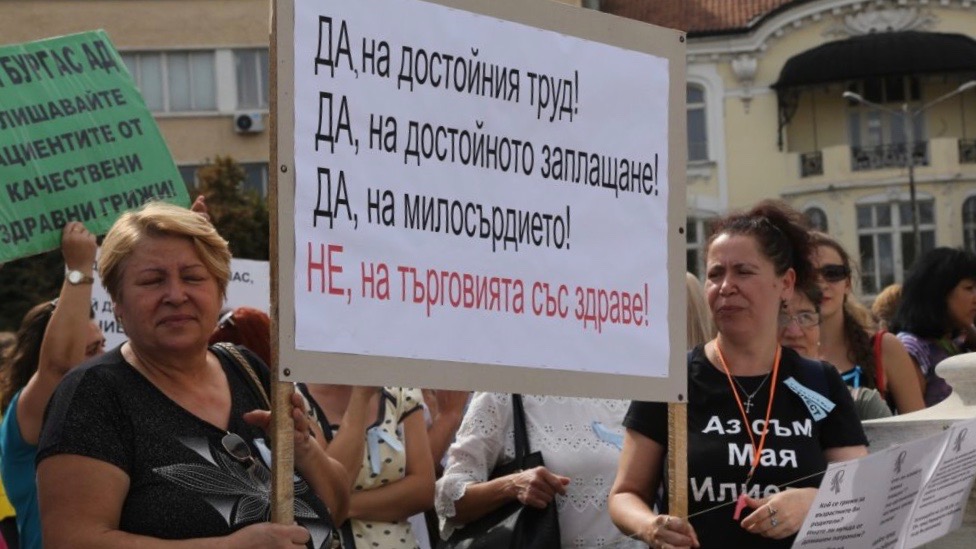The WHO’s regional office for Europe recently published the Bucharest Declaration on the Health and Care Workforce, in an attempt to provide guidance to countries as they face the effects of an aging health workforce and staff shortages. When the declaration was launched, the WHO Regional Director, Hans Kluge, said it should also be considered as a tool to address the reasons behind the wave of health workers’ strikes which Europe is currently facing.
For almost half a year, nurses, doctors, ambulance workers and others have been striking and demonstrating, demanding that governments finally act on the lessons brought on by the COVID-19 pandemic. Health workers want to see governments employ more staff and create better conditions in the sector, but policy makers have mostly ignored their requests.
While the accompanying statements of the Bucharest Declaration recognize the strikes in West Europe—from Germany to Ireland—the recommendations miss out on recognizing the specific position of health workers in East Europe. Workers on the periphery of the European Union have started to take action—perhaps in lesser numbers than their peers in the core countries—and fight against the position they have been forced into for the past years.
“This is the first time in years that nurses are calling us, interested and willing in getting unionized,” says Sopiko Japaridze, an organizer in Solidarity Network, a trade union in Georgia. Earlier, it was a feat reaching even a small number of health workers willing to discuss unionization.
Europe’s own pool of high-skilled, cheap health workers
Skilled health workers, including nurses, continue to leave Georgia because of bad working conditions and very low salaries. Thanks to trade union efforts, the government recently introduced a minimum wage policy in health care—but even with that, for many it still pays off more to work as informal carers in the EU.
A similar thing can be observed in eastern members of the EU itself, which are effectively used as polygons to train high-skilled health workers for the core countries’ health systems, willing to work for lower salaries than locals. Romania, where the Bucharest Declaration was announced, is among the top EU exporters of health workers. Estimates by the Romanian College of Physicians say that in only six years after the country entered the EU, approximately 14,000 licensed physicians emigrated. The trend applies to nurses, too. In 2018, 6% of all nurses in Italy came from abroad—mainly from Romania, but also from Bulgaria, Poland, as well as non-EU countries like Albania and Serbia.
Draining conditions in the workplace push many health workers to make up their own mind about emigrating. But a good deal of them are prompted to take the leap by recruiting agencies, who seem to be experiencing a productive period in East Europe. Corinne Hinlopen, Global Health Policy Researcher at Wemos, reflects on this as she considers the latest update of the WHO Health Workforce Support and Safeguards List.
“EU countries are not included on the list, but we can’t pretend that there are no differences between countries in southern and eastern Europe and those in the north and west. We should acknowledge that there are targeted recruitment drives implemented by many agencies operating in South and East Europe,” she says.
In the Bucharest Declaration, the specific position of different parts of the European region is not brought up—nor does it offer guidance on how to implement the selected aims without draining health resources from others.
Read: Health worker shortage in Global South cannot be resolved by tepid mechanisms and bans
It also remains unclear if all members of the region will actually be able to carry out the recommended measures, even if they understand the benefits they could bring. Japaridze is doubtful that the government in Georgia will begin devising such policies without being pushed to do so, or that it will actually have enough money to put them into practice. In fact, East European countries will have a much more difficult time finding the resources to make the improvements necessary to employ and retain more health staff as proposed by the WHO Europe declaration, in comparison to countries in West Europe.
This could very well mean that the implementation of the new health workforce guidelines will come at a high cost for health systems in Eastern Europe and those in the Global South, as high-income countries will continue to rely on international recruitment to meet their own staffing goals. But while she doesn’t see the emigration from Georgia to the EU stopping anytime soon, Japaridze says the shift in health workers’ approach to unionizing could actually pave the road to significant changes in the longer term. “A next step could be strengthening transnational organizing of migrant health workers originating from East Europe,” she points out.
People’s Health Dispatch is a fortnightly bulletin published by the People’s Health Movement and Peoples Dispatch. For more articles and to subscribe to People’s Health Dispatch, click here





